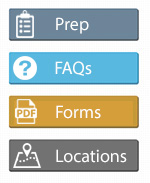Virtual Colonoscopy
What is a Virtual Colonoscopy?
A virtual colonoscopy is a method that allows radiologist to see the lining of the colon to detect polyps and cancers. Polyps are growths in the colon that may be cancerous if they are not removed. At University MRI a high-speed multidetector CT scanner along with specialized computer software images are obtained that "visualize" the surface contour of the colon. Images are seen in two and three-dimensional projections as well as views similar to those seen during a conventional colonoscopy.
Who should undergo Virtual Colonoscopy?
Beneficial for patients with conditions that prevent them from undergoing conventional Colonoscopy, such as a blood disorder, patient use of anticoagulant medication, intolerance of the required sedative, or other problems such as heart or lung disease.
Virtual Colonoscopy is ideally suited to evaluate the colon in whom conventional Colonoscopy was incomplete or in the preoperative assessment of the colon proximal to an obstruction cancer.
Patients who refuse to have conventional Colonoscopy out of fear or dislike for the procedure.
Frail, elderly patients are more easily examined by Virtual Colonoscopy.
When Should You Be Screened for Colorectal Cancer?
Screening for colorectal cancer should be a part of routine care for all adults starting at age 50. In those people with first-degree relatives with colorectal cancer, screening should start at an earlier age. Groups that have a higher incidence of colorectal cancer - those with hereditary conditions, such as familial polyposis, hereditary nonpolyposis colon cancer and inflammatory bowel disease - should consult with their health care providers as to the appropriate time to begin screening.
More common conditions with an increased risk include:
A personal history of colorectal cancer or adenomas
A first-degree family history of colorectal cancer or adenomas
A personal history of ovarian or endometrial cancer.
Advantages of Virtual Colonoscopy!
Faster and less invasive than conventional methods.
Does not require sedation.
No introduction of conventional scope into colon.
No use of barium enema.
Typical procedures completed in less than 15 minutes.
Better able to visualize polyps than barium enema.
Nearly as accurate as conventional invasive endoscopic Colonoscopy.
90% success rate for detection of all cancers and polyps over 10mm in size.
Capable of evaluating the colon upstream from obstructing lesions that prevent the passage of an endoscope.
Significantly less expensive than conventional Colonoscopy.
Is It Painful?
It has been stated that the most difficult part of the procedure for most patients is the preparation the day before the exam. Some patients, during the exam, experience "gas pains"or cramping with the introduction of air into the colon. This is usually temporary and rarely requires termination of the study. Proper distention is imperative to see the entire colon properly.
Is it Accurate?
Studies suggest a very high detection of polyps 1 centimeter or greater. These are the ones that have significant malignant potential. Smaller polyps are more difficult to detect. As with any procedure, including conventional colonoscopy, both polyps and cancers can be missed.
Why is screening important?
Colon Cancer is the third most common cancer among Americans and the second-leasing cause of cancer deaths. The disease will kill an estimated 56,000 people this year. Colon cancer can be prevented if polyps are discovered and removed early before they become cancerous. It is believed that tumors take years to develop and typically form from a benign (non-cancerous) polyp. If these polyps are removed early enough it can prevent the malignant disease.
Individuals remain largely under screened, in part due to poor public awareness and reluctance to accept current screening procedures.
Is it uncomfortable to have one?
Virtual Colonoscopy Screening is a new imaging procedure, simpler, faster and less invasive than a conventional colonoscopy. This technique uses two and three-dimensional images of the CT data to detect colon cancer without the discomfort of a colonoscopy.
When getting a Virtual Colonoscopy a person may experience some cramping from gas; however, sedation is not required allowing you to enjoy the rest of the day. It also affords you additional privacy because you do not have to inconvenience another person to drive you home. Virtual Colonoscopy is a highly accurate study approaching that of endoscopic colonoscpy. The study is performed and interpreted by one of our Board Certified Radiologists.


